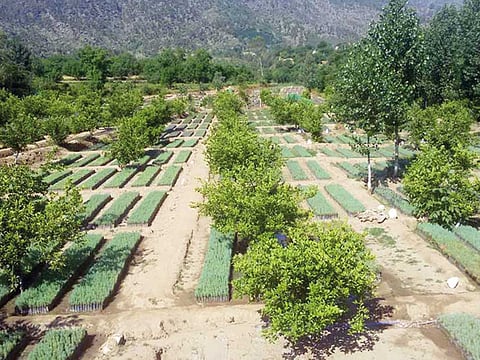Rainwater harvesting and plantation to be mandatory for Islamabad residents
Mandatory plantation drive aimed at improving green cover and bringing down temperature

Islamabad: In an attempt to address the depleting green cover and water scarcity challenges, Islamabad city management has made plantation and rainwater harvesting compulsory for households. All homeowners in Islamabad would be required by law to plant trees to restore the damaged urban green spaces and help cool the weather in the city which experienced temperatures above 42 degrees Celsius last week.
Rainwater harvesting
At the same time, all public sector buildings would have to install rainwater harvesting system to conserve and reuse water, according to Capital Development Authority (CDA) officials to solve the water scarcity issues in the capital city. “The CDA management has been actively pursuing policies to resolve the water issues of Islamabad” and has now made rainwater harvesting mandatory for all buildings to store excess water during the monsoon, which can be used for a range of purposes such as laundry, toilet flushing, garden watering, car washing and other cleaning activities.
Mandatory tree plantation
The existing city laws require only homeowners of 500 square yard plots and above to plant at least four trees. However, the city administration is amending the bylaws to make plantation compulsory for all households subject to the size of the land they own. The owners of five marla (one marla is 270 sq feet) houses would have to plant at least one tree, 10 marlas two trees, while owners of 500 square yards plots will have to plant four trees. The required number of trees would be higher for those who own more land.
The mandatory plantation drive is aimed at improving the green cover and cool down the temperature in Islamabad, the CDA chairman Amer Ali Ahmed said. Initially, the people would be offered incentives to encourage new plantation such as the “provision of free saplings to schools” to teach the kids about the environmental benefits of trees. Involving students in planting activities would help create awareness and convince their parents, families and communities to plant more trees. Action against violators would only be launched after a robust awareness and plantation campaign.
Residents welcome the initiative but call for support
Islamabad residents, especially those who have spent their childhood in the city, have welcomed the initiative. “Trees are a valuable natural asset of Islamabad city and are an integral and valuable part of the city’s culture and heritage. It is encouraging to see our city management taking action to protect our precious trees,” Mome Saleem, Islamabad-based environmentalist, told Gulf News. She suggested that CDA should rebuild a connection with the community committees to involve the public in plantation and improve their sense of ownership and environmental responsibility. CDA was also urged to encourage the plantation of native plants that adapt well to local environmental conditions and have numerous benefits.
Sanila Javaid, a resident of Islamabad’s F-8 sector, was so delighted to hear the news that she is already eager to plant trees in the whole neighbourhood. “I am thrilled that CDA is finally making plantation and rainwater harvesting mandatory. This step is extremely important to protect Islamabad from becoming a concrete jungle as many people have paved with cement the area outside their homes reserved for gardens and are using it for car parking,” Sanila told Gulf News. However, she asked CDA officials to offer guidance on the best trees to be planted in Islamabad and on the water storage system. “I love the water conservation aspect but would require a little help in the installation of a water harvesting system in my previously constructed home.”
Sign up for the Daily Briefing
Get the latest news and updates straight to your inbox








